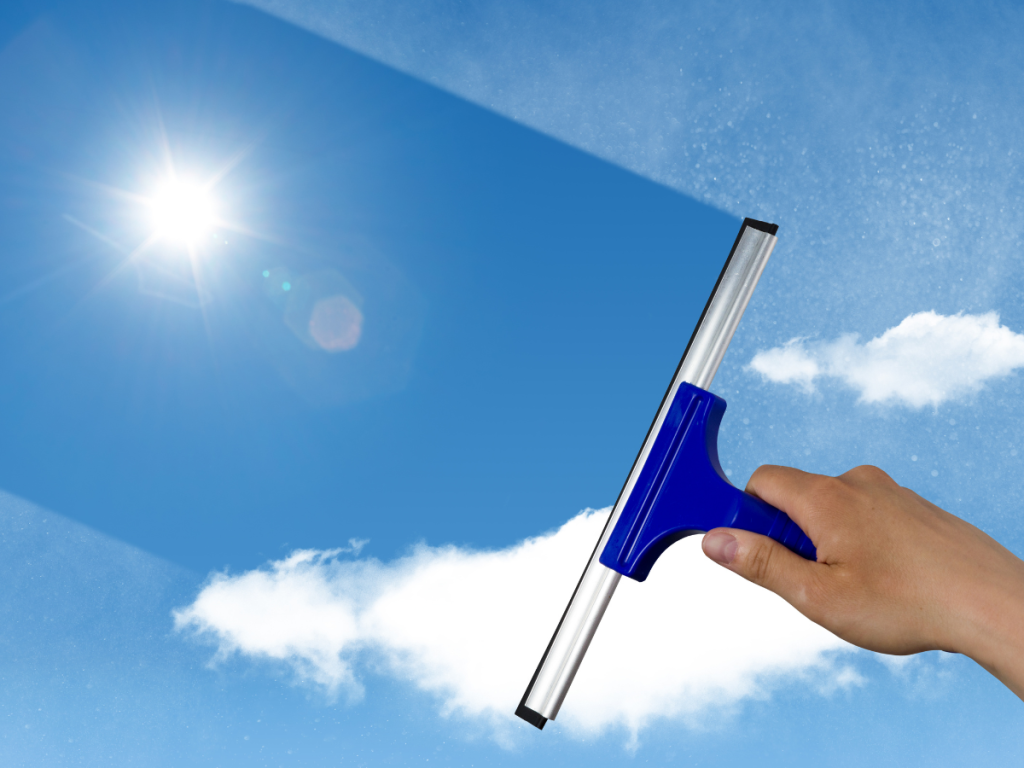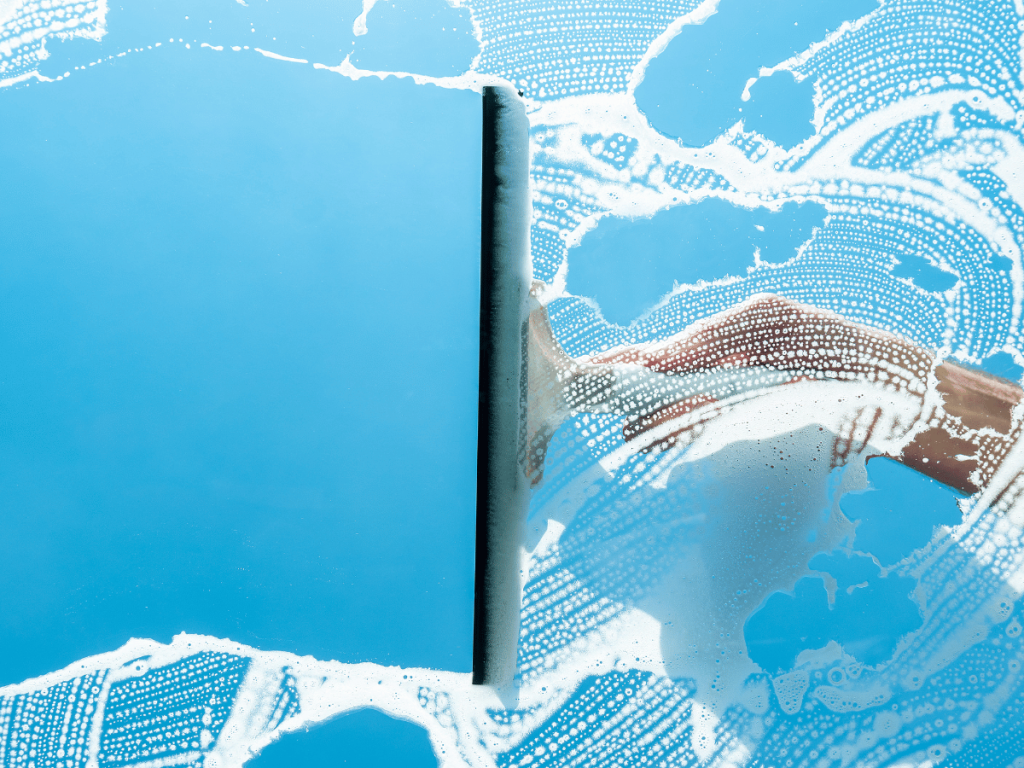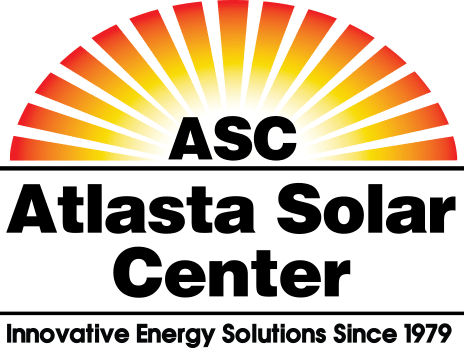You know that solar panels absorb and convert sunlight into energy. But did you know that how well solar panels operate depends on how clean they are? It’s a simple rule of thumb: the cleaner a solar panel is, the higher the energy production. The more dust and dirt accumulated on the panel, the lower the energy production. In fact, studies show that dirt on solar panels can decrease their energy efficiency by as much as 20%. Yikes!
At Atlasta Solar Center, we’re all about educating folks not only about the benefits of solar systems but also about how to properly care for them. Keeping panels free of debris and dust not only optimizes their energy production but can ultimately save you thousands in repairs and replacements. Let’s look at all about cleaning solar panels and solar panel cleaning equipment.

How Often Should Solar Panels Be Cleaned?
It is generally recommended that solar panels be cleaned every six months. However, factors such as where you live, and the weather, may call for more frequent cleanings. For example, if you live in a dry, dusty climate that receives little rain, solar panels should be cleaned several times a year. Also take into consideration if your panels are situated near trees and brush, as leaves, twigs, and bird droppings should also be cleaned off. If your home is by a construction site, your panels may also need more regular cleanings from all the dust accumulation.
The best rule of thumb for knowing when to clean your solar panels? If they’re dirty, simply clean them. Don’t wait for more debris to accumulate. Also, monitor your energy bills and note any changes. A decrease in energy output could likely indicate your panels are obstructed by grime and need to be cleaned.
Cleaning Methods: Manual or Automated
How are solar panels cleaned? There are two ways to do so: manual or automated. Manual cleaning utilizes solar panel cleaning brushes, water, and a non-abrasive cleaning solution. Automated solar panel cleaning is a robotic system that cleans solar panels without the need for human labor. A robot arm glides over the panels and thoroughly cleans them on a set schedule. Requiring minimal maintenance, and with no risk for personal injury, automated solar panel cleaning systems can greatly improve solar system productivity rates. However, these systems require a large upfront investment. For the purposes of this blog, we explore how to best manually clean your solar panels.
An Important Note Before Cleaning Your Solar Panels
With plenty of solar panel cleaning kits online, you may be tempted to order the first kit you see. But before you do so, it is essential that you review your solar system manufacturer’s manual first. Why? Each type of solar system has different maintenance requirements. By reading the manual, you can be exactly sure of what your solar system does and does not need when it comes to cleaning.
Solar Panel Cleaning Equipment
To clean solar panels manually, the following components recommended are:
Non-Abrasive Solar Panel Cleaning Solution: Be sure to use a non-abrasive cleaner only, as otherwise, you can greatly damage your solar panels. Some examples of solar panel cleaning solutions are vinegar diluted in water, or deionized or distilled water. A mild soap can also be used, but sparingly, as using too much can leave a film on solar panels.
Soft-Bristled Solar Panel Cleaning Brushes: Only use soft-bristled brushes to avoid scratching the panels.
Squeegee: Also referred to as a handheld wiper, a squeegee effectively removes excess water as you clean.
Water Fed Brush: This soft-bristled brush filters water onto the panels for more effective cleaning.
These items are available together in solar panel cleaning kits or can be purchased separately. As always, be sure to follow your solar system’s cleaning guidelines so you obtain the correct cleaning materials.
Clean Your Solar Panels Safely
Safety should be first priority while cleaning solar panels. Therefore, it is highly recommended that you skip using a ladder and use cleaning brushes that attach to adjustable extension poles instead. These types of brushes are available online with solar panel cleaning kits or can also be purchased separately.

How To Use Solar Panel Cleaning Equipment
Here are the following steps to effectively clean your solar panels.
Power Off the Solar System
Before cleaning, power off your solar system. This step is crucial, as otherwise, you risk electrocution if you attempt to clean the panels while they are powered on.
Remove Any Loose Debris
Before rinsing the panels, gently brush off any dust, twigs, bird droppings, etc. By removing loose debris before adding water, you can avoid smearing the panels.
Use Clean Water and Gently Brush
Using a water-fed brush or a garden hose, rinse away grime. Avoid using high pressure as this could result in cracks in the panels, especially if it is warmer out. If using a garden hose to rinse, remove the high-pressure attachment.
Gently scrub the panels with a soft-bristled brush, using a non-abrasive cleaning solution. A chemical-free cleaning solution you can make at home is by diluting vinegar in water. Mix one part vinegar with eight parts water. Avoid using bleach, detergents, car wash soap, and other household cleaning products, as these are abrasive chemicals that can damage panels.
Rinse and Squeegee
Rinse away any remaining dirt and cleaning solution, and squeegee the panels dry.
Helpful Solar Panel Cleaning Tips
No matter what type of solar setup you have, here are several tips that will help ensure your solar panels will be clean as possible.
Work In Small Sections
As you apply the cleaning solution to the panels, do so in small sections, so the solution doesn’t dry on the panels.
Clean On a Cooler Day
Solar panels become very hot from absorbing the sun. To avoid injury and discomfort, clean the panels on a cooler, cloudy day, or in the morning. Also, cleaning on a cooler day helps minimize the risk of the panels cracking as the water dries.
Note Energy Output Before and After Cleaning
Review your energy bills before and after cleaning. Doing so can help you gauge how well your solar panels operate after cleaning, as well as when they need to be cleaned again.
Use Calcium Free Water
While you can use your garden hose to rinse off your panels, be aware that this water may contain minerals. Known as hard water, this kind of water can leave residue, even after cleaning. Ideally, de-ionized or distilled water should be used to clean solar panels.
Never Use Hot Water to Clean Solar Panels
Hot water can result in cracking solar panels, so use cool water only.
Inspect the Panels
As you clean your solar panels, keep an eye out for anything out of the ordinary, such as cracks or dents. If you note any problems or have questions, contact us at 970-248-0057.
